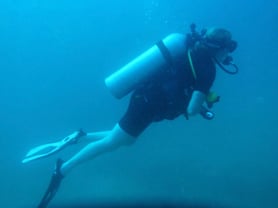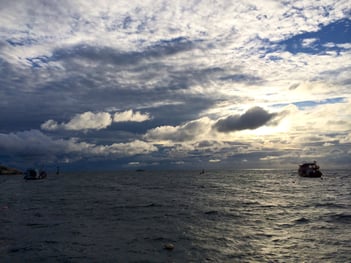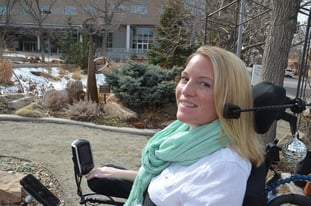Anything is possible - Blog - Reeve Foundation
Anything is possible if you put your mind to it. Even in the throes of living a life of complete quadriplegia, I have come to realize that if you are dedicated to living the life you desire and have determination to fulfill your goals, you can attain them with enough support from others and maybe a little crazy hair of bravery.
With this being said, I have successfully reached a major milestone after being paralyzed from the chest down for a year and a half. Next week I will, for the first time since my injury, submerge myself into an indoor practice swimming pool with the safeguard of wonderful people from Craig Hospital in Denver, Colorado, to prepare to regain my abilities as a scuba diver in preparation for a dive trip to Mexico this coming June.
A daunting task, especially without the use of my arms or legs, I will be fully dependent on my dive buddies to help perform dive skills essential for safety underwater such as what experienced divers called the big four. This includes clearing the mask, finding neutral buoyancy, emergency skills such as buddy breathing and most importantly de–pressurizing the ear canal as I drop down into the depths of the ocean.
Again with no use of my arms or legs, I will have to create an innovative strategy of notifying my dive buddies if something is wrong and how they might assist me. This might be with the blink of an eye, a shrug of the shoulders or a nod of the head. The days of giving the A-OK sign with my fingers are clearly over. Where there is a will, there is a way and I adapt to my new lifestyle of paralysis taking on this new venture as a challenge to regain one of my very dear passions in life – diving.
 My first dive was almost 20 years ago in Cairns, Australia, on a study abroad trip in college on the Great Barrier Reef on an unassuming day in which I randomly wandered into a dive shop wondering what it was all about needing an activity for the day. Little did I know that upon the following day I would be observing a giant underwater Disneyland that ultimately changed my life forever – I was hooked immediately. A whole world had opened up, now the idea of future traveling adventures could incorporate dives all over the world. The idea of seeing a shark underwater, an encounter I was terrified of since my childhood in Hawaii, no longer seemed scary but a mere excitement.
My first dive was almost 20 years ago in Cairns, Australia, on a study abroad trip in college on the Great Barrier Reef on an unassuming day in which I randomly wandered into a dive shop wondering what it was all about needing an activity for the day. Little did I know that upon the following day I would be observing a giant underwater Disneyland that ultimately changed my life forever – I was hooked immediately. A whole world had opened up, now the idea of future traveling adventures could incorporate dives all over the world. The idea of seeing a shark underwater, an encounter I was terrified of since my childhood in Hawaii, no longer seemed scary but a mere excitement.
I quickly became a certified diver and have dropped down all over the world including Fiji, the Virgin Islands, the Hawaiian Islands and the big Island of Hawaii where I have observed the giant manta rays at night measuring at 20 feet tip–to– tip wingspan. Divers only observe these animals at nighttime in two parts of the world and said this experience was quite magical and exciting.
I had always wanted to continue my certification process and expand my diving career to an advanced certification to bring me to other parts of the world. With this in mind, I was in Bali and Thailand in 2014 acquiring my yoga training and so therefore it seemed the appropriate time to take advantage of such a beautiful international dive location. And so therefore, just a mere two weeks prior to my spinal cord injury in August 2014, I was in Koh Tao, Thailand acquiring my advanced diver certification – no easy feat.
 A mere two weeks later, an unexpected accident diving into a swimming pool stateside resulted in my imploded C4/C5 cervical spine – my budding diving career was over. And to date, I have yet to recover any mobility or sensation below my mid chest; I rely on sip and puff technology to operate my power wheelchair. With no arms or legs how can one ever dive again? In an effort to always try and find the silver lining of any situation, I am fortunate enough to have maintained good breath control even with the high-level C fracture. I attribute this to my previous lifetime as an active Yogi and competitive swimmer/diver in which breath work was paramount.
A mere two weeks later, an unexpected accident diving into a swimming pool stateside resulted in my imploded C4/C5 cervical spine – my budding diving career was over. And to date, I have yet to recover any mobility or sensation below my mid chest; I rely on sip and puff technology to operate my power wheelchair. With no arms or legs how can one ever dive again? In an effort to always try and find the silver lining of any situation, I am fortunate enough to have maintained good breath control even with the high-level C fracture. I attribute this to my previous lifetime as an active Yogi and competitive swimmer/diver in which breath work was paramount.
The trip to Mexico is costly, as I will dive with two specialized trained dive buddies who will assist me on a drift dive off the coast of Cozumel. The plan is two dives per day for one week – this is an aggressive plan even for an able-bodied diver. I will need to travel with two caregivers whom will get me to the boat in time, in and out of the water safely, not to mention all other day to day cares. I must have faith that anything can be done even when it seems like challenges can be so great. I will continue to keep living the way I lived before which was full of adventure and never saying never. Anything can be done if you just put your mind to it.
Keep on keeping on…
Elizabeth/EB Forst
 Elizabeth Forst is a Doctor of Physical Therapy educated and trained at Regis University in Denver, Colorado, and has worked primarily as an orthopedic travel physical therapist with licenses in California, New York, Hawaii, and Louisiana.
Elizabeth Forst is a Doctor of Physical Therapy educated and trained at Regis University in Denver, Colorado, and has worked primarily as an orthopedic travel physical therapist with licenses in California, New York, Hawaii, and Louisiana.
Elizabeth began working with the Christopher and Dana Reeve Foundation in January 2015 as a member of the Public Impact Panel, or PIP, promoting advocacy for the paralyzed community, delving into quality of life issues and augmenting research initiatives for the epidural stimulation study also known as The Big Idea. Further, she is a nationally trained peer mentor for the foundation helping others similar to herself deal with paralysis type issues and providing realistic hope that there is in fact a beautiful life after injury.
Join Our Movement
What started as an idea has become a national movement. With your support, we can influence policy and inspire lasting change.
Become an Advocate